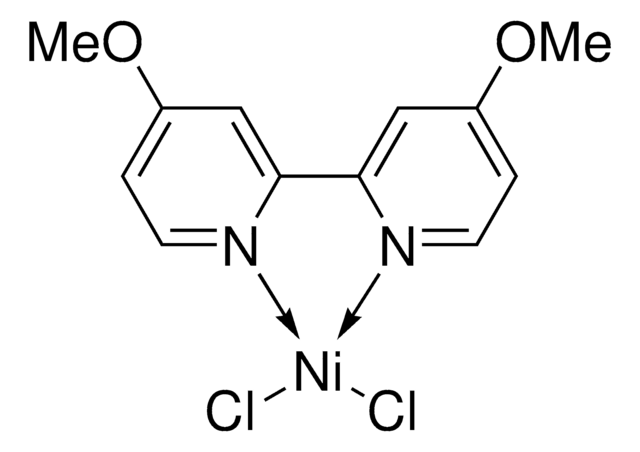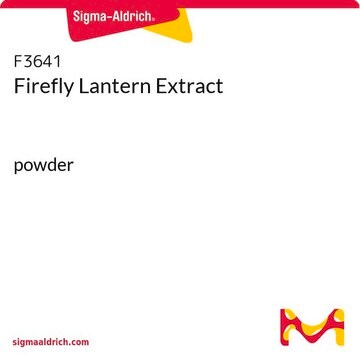10476498001
Roche
Luciferase
from Photobacterium fischeri
Sign Into View Organizational & Contract Pricing
All Photos(1)
About This Item
Recommended Products
biological source
bacterial (Photobacterium fischeri)
packaging
pkg of 2 mg
manufacturer/tradename
Roche
optimum pH
6.8
shipped in
wet ice
General description
Contents: Lyophilizate
Specific activity: Approximately 15 mU/mg protein at +25°C with FMN and myristine aldehyde as the substrates, and 50 mU NAD(P)H:FMN oxidoreductase per ml assay solution (based on the relative light emission in the ATP system under the formation of pyrophosphate with 1 mU luciferase from Photinus pyralis).
Alkanal reduced FMN-oxygen oxidoreductase (1-hydroxylating, luminescing)
Luciferase from bacteria exists as a heterodimer with α and β chains.
Application
Luciferase may be used:
- to treat mammary tumor cryosections for bioluminescence imaging studies
- as a component of luciferase reaction mixture
- in bioluminescence assay membrane preparations of Zymomonas mobilis
Biochem/physiol Actions
Luciferase catalyzes the conversion of reduced flavin mononucleotide in the presence of oxygen and long-chain aldehyde to flavin mononucleotide, visible light and a fatty acid. It is a reporter enzyme for sensitive quantitation. The lucifearse fusion proteins have been useful in many protein based interaction studies especially in living cells.
Quality
Contaminants: <10 mU NADH:FMN oxidoreductase/mg protein, <10 mU myokinase/mg protein, and <1 mU NADH oxidase/mg protein
Storage and Stability
Store at 2 to 8 °C. (A decrease in activity of approximately 20% may occur within 12 months.)
Other Notes
For life science research only. Not for use in diagnostic procedures.
Storage Class Code
11 - Combustible Solids
WGK
WGK 1
Flash Point(F)
No data available
Flash Point(C)
No data available
Certificates of Analysis (COA)
Search for Certificates of Analysis (COA) by entering the products Lot/Batch Number. Lot and Batch Numbers can be found on a product’s label following the words ‘Lot’ or ‘Batch’.
Already Own This Product?
Find documentation for the products that you have recently purchased in the Document Library.
Customers Also Viewed
A Eberhard et al.
Biochemistry, 20(9), 2444-2449 (1981-04-28)
Synthesis of bacterial luciferase in some strains of luminous bacteria requires a threshold concentration of an autoinducer synthesized by the bacteria and excreted into the medium. Autoinducer excreted by Photobacterium fischeri strain MJ-1 was isolated from the cell-free medium by
S Walenta et al.
International journal of radiation oncology, biology, physics, 51(3), 840-848 (2001-11-09)
It has been shown that oxygen gradients exist in R3230AC tumors grown in window chambers. The fascial surface is better oxygenated than the tumor surface. The purpose of the present study was to determine whether gradients exist for energy metabolites
Interspecific luciferase beta subunit hybrids between Vibrio harveyi, Vibrio fischeri and Photobacterium leiognathi
Almashanu S, et al.
Protein engineering, design & selection : PEDS, 9(9), 803-809 (1996)
Engineered luciferase reporter from a deep sea shrimp utilizing a novel imidazopyrazinone substrate.
Mary P Hall et al.
ACS chemical biology, 7(11), 1848-1857 (2012-08-17)
Bioluminescence methodologies have been extraordinarily useful due to their high sensitivity, broad dynamic range, and operational simplicity. These capabilities have been realized largely through incremental adaptations of native enzymes and substrates, originating from luminous organisms of diverse evolutionary lineages. We
Uldis Kalnenieks et al.
Microbiology (Reading, England), 149(Pt 7), 1739-1744 (2003-07-12)
The respiratory inhibitor cyanide stimulates growth of the ethanologenic bacterium Zymomonas mobilis, perhaps by diverting reducing equivalents from respiration to ethanol synthesis, thereby minimizing accumulation of toxic acetaldehyde. This study sought to identify cyanide-sensitive components of respiration. In aerobically grown
Articles
Firefly luciferase is a sensitive reporter for gene studies due to its absence in mammalian cells or tissues.
Our team of scientists has experience in all areas of research including Life Science, Material Science, Chemical Synthesis, Chromatography, Analytical and many others.
Contact Technical Service










